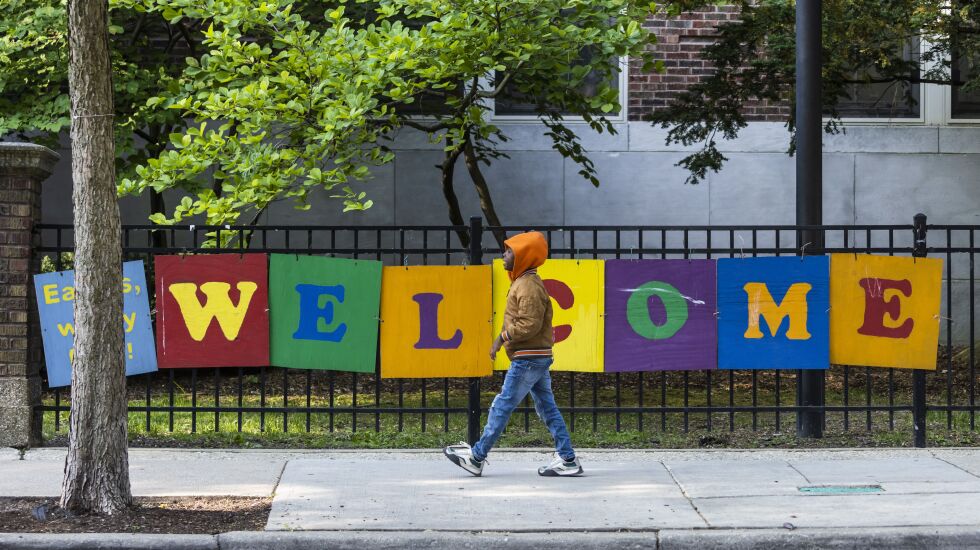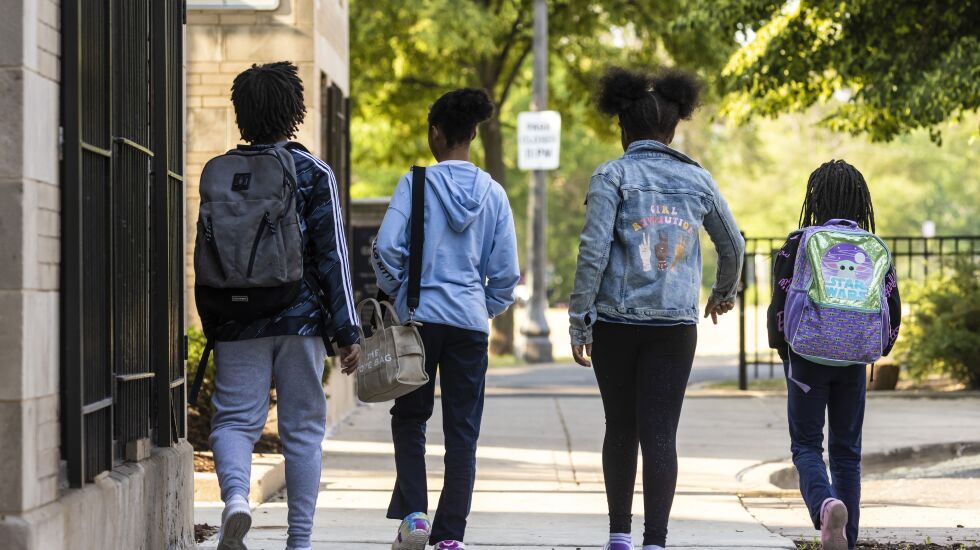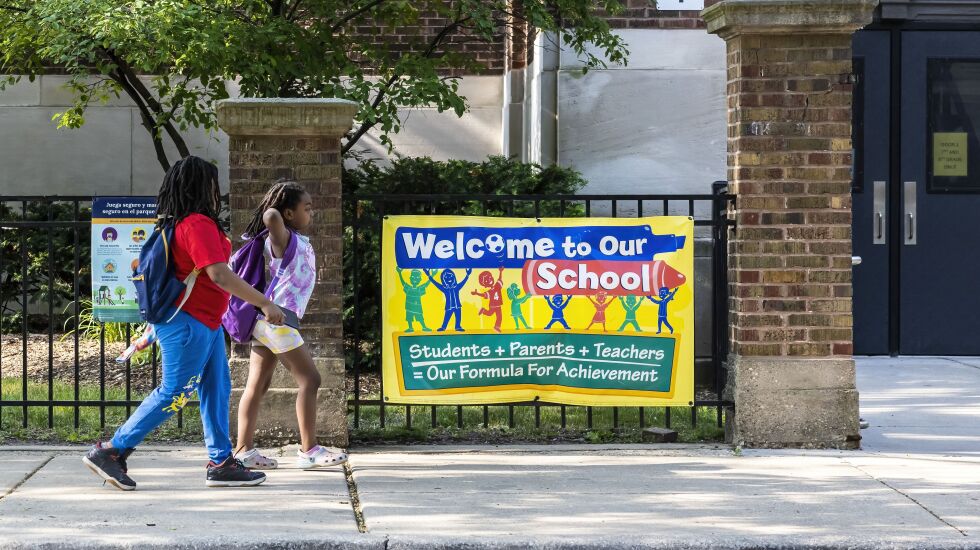
What should parents of school-age children know before a new academic year begins? A small group of local education experts weigh in on how to start the 2023-24 school year right with tips to support children during this transition and beyond.
It’s OK not to be OK
Sophie Leventhal, dean of students at north suburban Kenilworth’s Joseph Sears School, said, “Any change can be both terrifying and wildly exciting at the same time. Many adults have a tough time noticing and naming how they feel because most of us grew up with the age-old advice, ‘Oh, it won’t be that bad, don’t be silly or emotional, distract yourself and forget about it.’
“Just inquiring about what excites or worries your child can ease their nerves. Helping kids name and explore their emotions, how these feelings sit in their bodies and what they can do to be calm is so crucial to their development.
“I highly recommend using a tool like the Mood Meter from Marc Brackett, author of “Permission to Feel” — there is even an app — as you brave new territory.”
“When your child is sharing their feelings, actively listen, and when they’re done, let them know you’ve heard them. It takes vulnerability to speak our truth, and when we respond with dismissal or shame, it keeps kids from wanting to tell us how they feel in the future.

“As hard as it might be, be laser-focused about validating their experience, hold space for whatever it is they just shared, and replace the word but with and. For example, try something like, ‘I hear that you’re nervous about all the new teachers. That must feel scary, and you are so great at building relationships with people.’
“Try not to unintentionally dismiss them by saying, ‘Oh, honey, teachers love you; you have nothing to worry about.’”
Build confidence
Transitions into a new school year can be challenging, so remind kids of their strengths to build resilience.
One way to get kids mentally prepared to start a new year is by reminding your child of all the ways they are already excelling, without diminishing or dismissing what might be genuine fear or worry about a new grade level.
Think about learning strategies they have previously perfected or praise their social-emotional strengths. Encouragement with specific examples goes a long way, especially when your compliments are unprompted or seemingly random in nature.
You might say something like, “Look, you already know all your numbers. You’re going to be in such great shape in kindergarten!” Or, “It’s amazing how you’ve mastered the idea of homework; this will really help you in middle school!”
This kind of praise can be especially powerful if you have a child who struggles academically or organizationally, so consider formatting your compliments to suit your child’s strengths: “You’re going to do so well because you really know how to advocate for yourself by asking such great questions.”
Instill independence
You know your child best, so you understand what type of independence might be most appropriate for their age and developmental stage.
Whatever this looks like for your child, Mike Klotz, a special education teacher at Acero Cruz Charter on the North Side, said, “Begin working on grade-appropriate independence at home. Our goal as teachers and parents should be to have our kids be as independent as possible. What do they do when they are in new situations?”
This might mean purchasing slip-on shoes before a child learns to tie laces so they don’t have to depend on a teacher. Or it could mean allowing kids time to practice unscrewing the top of their water bottle and filling it themselves. “Obviously,” Klotz said, “we cannot prepare our kids for everything, but we can help them adapt by instilling confidence.”
Start fresh
Marty Behm, assistant principal at McCracken Middle School in Skokie, said every school year is a chance to start anew: “Remember, every year brings new teachers and new opportunities, so feel encouraged to bring a new attitude, make new friends and learn new things.” Try to leave the old drama from the previous year in the past.
And if some of those triggers that irked you last year rear their ugly heads, don’t forget to practice deep breathing, muscle relaxation or meditation, said Allie Szczecinski, a social-emotional learning coach in Winnetka. You can practice coping skills at home in case kids become dysregulated, nervous or overwhelmed on the first day.
Reach out
Now that summer’s end is getting closer, encourage your child to network. Take these last few weeks before returning to school to reach out to friends they may not have seen or spoken with and schedule a play date. Also, access neighborhood connections.
Older children don’t necessarily need to make plans in person. Just texting or messaging someone about the upcoming school year could have huge benefits, especially for those starting in a new school or district.
Let’s get organized
Szczecinski, who is known as Miss Behavior on Instagram, recommends that “parents create a visual, kid-friendly calendar so kids can see and track time.” Add the important dates into the calendar, like back-to-school events leading up to the first day. Kids can visually track the time, even before they learn to read. Hang this calendar at eye level whenever possible. The calendar can also be a great way to extend organization into the school year.
As for school supplies, Szczecinski told parents to “offer choices for their kids rather than having the adults pick them out for the child. This process creates more buy-in and gives kids ownership. Also, it can help to make the first day even more exciting because kids will look forward to debuting their new items.”
Think logistics: Practice makes perfect
Make sure your child knows exactly how they’re getting to school, said Nicole Marks, a former suburban PTA president. “Our former principal used to advise us that if kids are walking alone, make sure they have mastered the commute, both ways, because the way home looks different!”
Does your child plan to walk with a friend? Will they bring lunch or buy it at school? Having confidence in the first-day plan can help kids feel more secure.

For kindergartners, physical education teacher Kathleen Woodward suggested students practice eating lunch on a set schedule. Can they open the containers if you’re packing their lunch? Also, can they finish the majority of their meal within the given time limit?
For first-year middle school students, combination locks can be an issue. If your child’s school asks students to supply their own lock, Yasmine Qader, social science content facilitator, said kids should practice unlocking them at home. If your child’s school supplies the locks, consider getting them comfortable with the pattern or routine of twisting them open. Check YouTube for easy tutorials.
If you notice your child struggling with the classic twisting pattern of the combination lock, there are other lock variations that work, like those that have one specific number code at the bottom. But stay away from locks that use keys.
Remember, if kids don’t have it down pat by the first day, do not worry. You’ll have plenty of grace time in the first few weeks to learn all these new skills.
Remember your power
Kids of all ages are like sponges. Martha Mann, a former middle school teacher in Evanston, said, “Parents’ attitudes about school, teachers, tests and homework often become their kid’s attitude. Kids will hear the things parents say, even in passing or on the phone with friends, and that will shape how they approach school.”
Little ears are usually listening, no matter how fleeting or insignificant that negative comment might feel. The same goes for positive comments. If you compliment your children’s teachers in front of your kids, it might breed positivity in and out of the classroom.
Be specific
Kelly Post, an early elementary teacher at Kingsley Elementary School in Evanston, said you should ask specific questions to get specific answers about a kid’s day. So ditch the age-old, “How was your day?” Instead, Post said, try, “Who did you sit next to today at lunch?” Or, “What do you remember about the story your teacher read?”
This comes in handy for all children, no matter their age. Megan Witt, special education teacher at Haven Middle School in Evanston, asked her children this list of questions: “What was the funniest thing that happened today?” “Did anything make you sad or mad?” “What is something nice you did for someone else?”
Nicole Marks played “Rose, Thorn & Morning Glory” with her middle and high schoolers at night during dinner. “The rose was something great that happened; thorn was the worst thing; morning glory is what they’re most looking forward to … and actually, we played it for years!”
We’re all in this together
The first day of school can be daunting, but giving your child a little perspective is always nice: Everyone feels this way. The big picture can be powerful, and as parents, you can say this in a way that doesn’t dismiss their feelings. Everyone is nervous and excited, too — even the teachers! School is a community, and we will get through this year together.
If your child is struggling beyond what might be considered a range of normal, reach out to your school’s psychologist. Don’t suffer in silence, said Marilyn Soglin, a paraprofessional educator at a small suburban therapeutic day school. “If your child is really freaked out about the next school year, go see the school psychologist or social worker before the start of school.”
Simone Larson is an award-winning writer and middle school teacher in Evanston.







